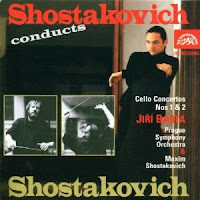Shostakovich was teacher to Rostropovich I believe for orchestration in the 1940s and he certainly held a deep respect for his teacher. When interviewed by The Strad in their May 1959 issue by M.B.Stanfield, his account of the Shostakovich and Prokofiev cello concertos as "They are supreme masterpieces and one cannot expect all music to come up to their standard" says it all.
Both Shostakovich and Rostropovich share a common trait in having a heavy dose of Russian politics intertwined into their musical career. Shostakovich did it mainly through his composition and Rostropovich his stellar cello performance. Shostakovich had many brushes with Stalin having been publicly denounced by Stalin and thereafter living in paranoia fear of death as people who cross path with Stalin have a habit of disappearing from the face of the earth. Although he outlived Stalin who died in 1953, the mental torture has left a debilitating mark on his psychological landscape as evident in many mysterious and unexplainable passages in his compositions. It was mentioned in passing that the fear of death might have been a greater torture than death itself.
As for Rostropovich, it could have been a soul born in the wrong country so to speak as he was very much a libertarian at heart living in communist Russia. In-spite of this, he had great love for motherland Russia choosing to return once his revoked Russian citizenship was restored and was laid to rest in Russia. Some of his landmark political highlights including performing in London in 1968 on the day when Russian tanks rolled into Poland. There was widespread protest at the concert but Rostropovich continued playing Polish composer Dvorak piece with tears in his eyes. The second significant event this time of his choosing was an impromptu basking in front of the Berlin wall in 1989 when the wall came down.
As with most Shostakovich composition, there is little explanation or narration giving the performer and audience almost total free play in interpreting the music with little or no point of reference save for the historical canvas against which it was written in. My main aim in the review of this cello concerto is to provide that backdrop so that you can enjoy the music more deeply in whichever way you heart bring you as there are enough exposition on the music itself.
Briefly, the piece has the signature Shostakovich motif DSCH written all over the piece. Mainstream opinion that it is only a translation of his name could be too simplistic for this four note motif. I think this queasy four note motif that pervades most of his work has a very deep meaning of a man that has gone through much psychological torture and the equation to his name could be a mere coincidence.
This four movement piece also has a unique feature of having the third movement almost exclusively a cadenza. The possible raison detre is to hall mark the piece as a virtuoso to allow Rostropovich latitude to display his prowess. In reviewing the piece with Shostakovich, Rostropovich has told him not to worry about the outer limits of the cello and just let his soul lead the way. This also explain why this piece is one of the more technically challenging piece amongst the limited cello concerto repertoire.
In the last movement, there lies a distorted version of Suliko song which is a favorite of the now dead Stalin. Perhaps it is meant as a mockery of Stalin than a respectful acknowledgement. Unfortunately, he has brought it to the grave without mentioning anything about it.
Lastly Shostakovich has mentioned personally that he drew much inspiration of this piece from Prokofiev Sinfonia Concertante but perhaps my limited understanding of Prokofiev music has me finding it hard to see the relationship between the two. Maybe my love for Shostakovich music as this juncture has to do with the circumstances I am embroiled in.
Some of the recordings I have listened to while writing this article are as follows and it is not in any particular order of preference or merit.
1. Mstislav Rostropovich, Seiji Ozawa, London Symphony Orchestra
2. Mstislav Rostropovich, Gennady Rozhdestvensky, USSR State Symphony Orchestra
4. Yo-Yo Ma, Eugene Ormandy, Philadelphia Orchestra
5. Heinrich Schiff, Maxim Shostakovich, Bavarian Radio Symphony Orchestra
6. Jiri Barta, Maxim Shostakovich, Prague Symphony Orchestra
7. Alexander Ivashkin, Valeri Polyansky, Moscow Symphony Orchestra
8. Frans Helmerson, Valeri Polyansky, Moscow Symphony Orchestra
9. Mischa Maisky, Tilson Thomas, London Symphony Orchestra
Peter Lye aka lkypeter
Safe HarborPlease note that information contained in these pages are of a personal nature and does not necessarily reflect that of any companies, organizations or individuals. In addition, some of these opinions are of a forward looking nature. Lastly the facts and opinions contained in these pages might not have been verified for correctness, so please use with caution. Happy Reading. Copyrights of all contents in this blog belongs to Peter Lye unless stated otherwise.
Safe HarborPlease note that information contained in these pages are of a personal nature and does not necessarily reflect that of any companies, organizations or individuals. In addition, some of these opinions are of a forward looking nature. Lastly the facts and opinions contained in these pages might not have been verified for correctness, so please use with caution. Happy Reading. Copyrights of all contents in this blog belongs to Peter Lye unless stated otherwise.












